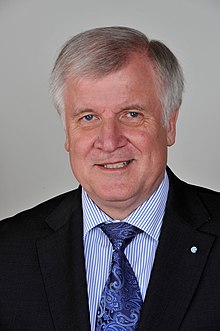Horst Seehofer
| Horst Seehofer | |
|---|---|
 |
|
| Minister President of Bavaria | |
|
Assumed office 27 October 2008 |
|
| Deputy |
Ilse Aigner (since 2013) Martin Zeil (2008-2013) |
| Preceded by | Günther Beckstein |
|
President of Germany Acting |
|
|
In office 17 February 2012 – 18 March 2012 |
|
| Chancellor | Angela Merkel |
| Preceded by | Christian Wulff |
| Succeeded by | Joachim Gauck |
| President of the Bundesrat | |
|
In office 1 November 2011 – 31 October 2012 |
|
| Preceded by | Hannelore Kraft |
| Succeeded by | Winfried Kretschmann |
| Chairman of the Christian Social Union | |
|
Assumed office 25 October 2008 |
|
| Preceded by | Erwin Huber |
| Federal Minister of Food, Agriculture and Consumer Protection | |
|
In office 22 November 2005 – 27 October 2008 |
|
| Chancellor | Angela Merkel |
| Preceded by | Renate Künast |
| Succeeded by | Ilse Aigner |
| Federal Minister of Health | |
|
In office 6 May 1992 – 26 October 1998 |
|
| Chancellor | Helmut Kohl |
| Preceded by | Gerda Hasselfeldt |
| Succeeded by | Andrea Fischer |
| Member of the Bundestag | |
|
In office 1980 – 2008 |
|
| Succeeded by | Reinhard Brandl |
| Personal details | |
| Born |
4 July 1949 Ingolstadt, Bavaria, Germany |
| Political party | Christian Social Union |
| Spouse(s) | Karin Seehofer |
| Children | 4 |
| Religion | Roman Catholicism |
| Signature | |
| Website | Official website |
Horst Lorenz Seehofer (born 4 July 1949) is a German conservative politician (CSU). He served as the Federal Minister for Health and Social Security from 1992 to 1998 and as the Federal Minister of Food, Agriculture and Consumer Protection in the cabinet of Angela Merkel from 2005 to 2008. In October 2008 he became chairman of the CSU and Minister President of Bavaria. In 2011/12 he served as President of the Bundesrat.
He is married to Karin Seehofer.
After secondary school, Seehofer started working as an errand boy in the local administration in Ingolstadt.
Seehofer served as member of the Lower House of the German Parliament (Bundestag) in Germany from 1980. He was Federal Minister for Health and Social Security from 1992 to 1998 in the cabinet of Chancellor Helmut Kohl.
In 1993, Seehofer ordered that Germany's 117-year-old Federal Health Agency be dissolved following a review of how the government in the 1980s handled the cases of thousands of hemophiliacs who were infected through blood contaminated with H.I.V. The Health Ministry took over the agency's responsibilities. Also, Seehofer announced that Germany would contribute to an emergency fund for victims of the scandal. In the context of the crisis, he came under considerable pressure to resign.
...
Wikipedia
